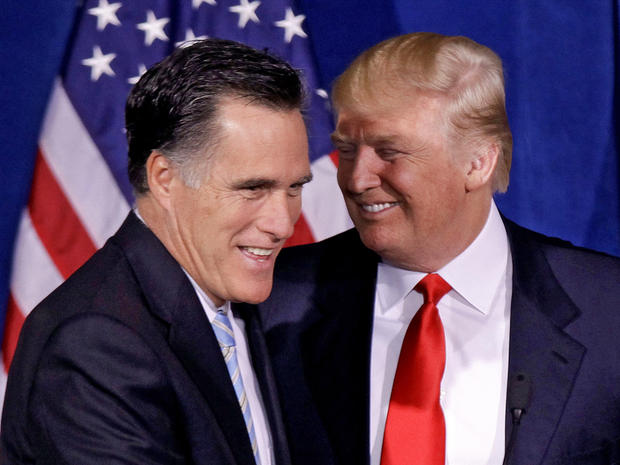After public financing forsaken, a dash for cash
(CBS News) President Obama and Mitt Romney have plenty to worry about: Running the country, rolling out a running mate, overseeing their campaigns and getting as firm a grasp as possible on the problems of everyday Americans. Despite all those duties, both men have spent the past few months making time - an awful lot of time, in fact - to raise campaign cash.
Since April 24th - the night he declared himself the presumptive Republican presidential nominee - Romney has held at least one fundraiser on 55 days. That's nearly every other day, and doesn't count Romney's three-day Utah retreat with donorsor the fundraisers he's held without informing the press. Last weekend, meanwhile, Mr. Obama held his 200th fundraising event since filing as a candidate for reelection on April 4, 2011. Both candidates are holding fundraisers this weekend, with Romney hitting four different posh locations Friday and Saturday: The Hamptons, Martha's Vineyard, Cape Cod and Nantucket.
Why do the candidates spend so much time of their time raising money? Because they aren't getting it for free. Between 1976 and 2004, every presidential candidate accepted public financing -- money designated by the taxpayers to pay for their campaigns. Public financing was established to clean up presidential politics amid outrage over Richard Nixon's fundraising transgressions; in partially upholding a court challenge to the system in 1976, the Supreme Court said it could allow America to "reduce the deleterious influence of large contributions on our political process, to facilitate communication by candidates with the electorate and to free candidates from the rigors of fund raising."
For candidates taking public financing, there was one huge catch: They had to accept limits on how much they could spend on the election. Which is why in 2008, Mr. Obama became the first major party presidential candidate since the system was put in place to turn the money down. Mr. Obama gave up $84 million in taxpayer dollars for the general election campaign; he ended up raising a record-breaking $745 million overall. (Sen. John McCain, the Republican presidential nominee, took the money.)
"We have created a parallel public financing system where the American people decide if they want to support a campaign they can get on the Internet and finance it, and they will have as much access and influence over the course and direction of our campaign that has traditionally been reserved for the wealthy and the powerful," Mr. Obama said at the time.
Neither Mr. Obama nor Romney ever really considered accepting public financing this time around. That's because they knew the amount of money they could raise far exceeded the $91.2 million cap they would have had to accept on their general election spending if they decided to do so. (Consider: In July alone, Romney raised $101 million and the president brought in $75 million.) The only two candidates granted the money this cycle were Buddy Roemer and Gary Johnson, minor party candidates given the cash for their primary campaigns.
"At the federal level, public financing is effectively dead," said Bob Biersack of the Center for Responsive Politics, who believes the caps on spending are far too low to keep pace with the unprecedented sums now flowing into the campaigns. "It's just that nobody told it it isn't breathing anymore." Strong public financing systems do exist on the state and local level.
Biersack added that because presidential candidates must spend so much of their time raising money in the absence of public financing, they're "not spending time connecting with voters in the same way they did before."
Presidential public financing is paid for by asking people if they want to participate when they file their income taxes; if they say yes, $3 from their taxes is set aside. While the major party candidates aren't getting any of that money, more than $18 million was designated to help pay for each of their party conventions. (The Senate voted in June to strip public funds from the conventions, and the House voted to do so last year, but it will survive at least through this election.) As of the start of April, the latest data available, there was nearly $250 million in the Presidential Election Campaign Fund. According to the Federal Election Commission and Department of the Treasury, that fund will remain untouched barring an act of Congress.
Many in Congress do want to change the system. But they have very different ideas on what to do. House Republicans have voted to simply end public financing altogether, arguing it is an unnecessary use of taxpayer dollars. As a spokesperson for Majority Leader Eric Cantor said last year, "The reality is that political campaigns operate entirely differently today than they did in the 1970s. Technological advancements have fundamentally altered modern elections so that all candidates have the opportunity to communicate to broad audiences and secure the resources needed to run a successful campaign, a fact that was proven by President Obama and his team." The Congressional Budget Office estimated last year that eliminating public financing would save $617 million over 10 years.
Democrats oppose eliminating the system, arguing that it would increase the influence of special interests in elections even beyond what has happened in the wake of the Supreme Court's Citizens United decision, which allowed the unfettered flow of corporate and union money into politics. In June, a group of Democratic lawmakers introduced legislation that would increase the public funds available to candidates, among other changes to the law. Taxpayers would provide a 4-to-1 match for individual contributions less than $200 and donations would be limited to $1,000 per election, down from the current $2,500. To help pay for this, the "check off" on income tax returns would be increased from $3 to $10.
With control of Congress split between the two parties, neither the Republican effort to repeal public financing nor the Democratic effort to reform it stands a chance of passage. Craig Holman, government affairs lobbyist for advocacy group Public Citizen, argues democracy would benefit from finding a way to get taxpayer dollars back into federal elections.
"Public funds come with no strings attached," he said. "There's no special interests behind the public financing that wants you to do something -- that's trying to buy the office for you in order to get something in return."

